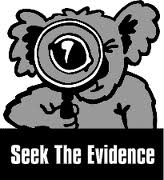
First of all, logically there can be no atheists. Much more than simply believing that one cannot know God, an atheist makes the irrational claim that ‘There IS NO God.’
"An atheist, like a Christian, holds that we can know whether or not there is a God. The Christian holds that we can know there is a God; the atheist, that we can know there is not." Bertrand Russell; Religions of America; pg 285
All believers believe, but no believer makes the assertion that proof of God is tangible. This is the essence of faith – why ‘believers’ are called ‘believers.’ Evidence for God is everywhere, if we're looking for it, but there does not exist direct, indisputable 'proof.' But for an atheist to say ‘There is NO God’ assumes, in the absence of proof or knowledge, that the atheist is in fact ‘all-knowing!’ He has just disagreeing with himself, since he just made an omniscient (all knowing) claim by claiming to KNOW this ‘unknowable’ fact!
Since there can be no atheists, what remains in the world of skeptics are agnostics, or those who have no-knowledge (a-gnostic). There are two kinds of agnostics, those who are seeking for the answers, and those who are content in their not-knowing.
What are the consequences of not believing? Consider Pascal's Wager. Blaise Pascal was an eminent scientist who invented the thermometer, and was highly noted for his scientific reasoning. He postulated that seeking and serving God has benefit in this life and the next if there is a God. So, serving God in this life has no cost. But if you were to wager that there is no God and you choose to ignore him, you may lose everything if He does exist. In this position you've lost your wager and there is no recovery. In other words, the atheist is making a large bet in which he could pay a terrible price if he is wrong
But what if the atheist is right? Taking atheism to its logical conclusions, life is meaningless. There would be no absolute truth, no basis for morals, and no reason to survive. The atheist will declare that he does in fact have basis for these items, but it seems that everything is relative if everything is based upon chance. How can we even be sure we are in control of our own thoughts if there is no design? Who is to say that evil is not ok as long as someone 'wants' it – who are we to say it's wrong? If the majority rules everything, or if the strongest survive, we may not complain when we are crossed, for it was meant to be.
Dr. Ravi Zacharias has described the lot in life to be expected in a free-for-all worldview, and is called The Atheist's Creed:
We believe in Marx, Freud, and Darwin. We believe that everything is ok, as long as you don’t hurt anyone, to the best of your definition of hurt, and to the best of your definition of knowledge. We believe in sex before, during and after marriage, we believe in the therapy of sin. We believe that adultery is fun, we believe that sodomy is ok, we believe that taboo’s are taboo. We believe that everything is getting better despite evidence to the contrary. The evidence must be investigated and you can prove anything with evidence. We believe there is something in horoscopes, UFO’s and bent spoons. Jesus was a good man just like Buddha, Muhammad and ourselves. We believe he was a good moral teacher although we think his good morals were really bad. We believe that all religions are basically the same, at least the one that we read was. They all believe in love and goodness, they only differ in matters of creation, sin, heaven, hell, God, and salvation.
We believe that after death comes nothing because when you ask the dead they say nothing. If death is not the end then there is heaven for all except maybe Hitler, Stalin, and Khan. We believe in Masters and Johnson, what is selected is average, and what is average is normal and what is normal is good. We believe in total disarmament, we believe there are direct links between warfare and bloodshed, and that the Americans should beat their guns into tractors and the Russians will be sure to follow. We believe that man is essentially good, it is only his behavior that lets him down. This is the fault of society, society is the fault of conditions, and conditions are the fault of society. If man does what is right for him, then reality will adapt accordingly. The universe will re-adjust, history will alter. We believe there is no absolute truth except that there is no absolute truth. We believe in the rejection of creeds and the flowering of individual thought.
If chance is the father of all flesh, then disaster is his rainbow in the sky. When in a state of emergency the sniper kills the child, the youth go looting, or bomb blasts rock the school, it is nothing more than the sound of man worshiping his maker.
The evils in the world as a result of this type of belief system are tremendous. If the strong survive (and rule), what are the consequences? The 'goodness of man' has been proven to be a fantasy. In that great period of ‘enlightenment,’ the Twentieth Century, over 6 million Jews were murdered, over 20 million Ukrainians, 50 million Chinese, roughly one third of the population of Cambodia, countless Hutu’s and Tutsi’s, etc etc etc, all in the name of man's pursuit of unbridled power resulting from the belief in no absolute truth. Easily over 100 million people have been murdered in the 20th century alone in the name of someone’s progress toward utopia.
Is Atheism a serious worldview, or is it a means to something else? Not all atheists would agree with this position, but consider the words of one prominent atheist:
"For myself, as, no doubt, for most of my contemporaries, the philosophy of meaninglessness was essentially an instrument of liberation. The liberation we desired was simultaneously liberation from a certain political and economic system and liberation from a certain system of morality. We objected to the morality because it interfered with our sexual freedom…The supporters of these systems claimed that in some way they embodied the meaning of the world. There was one admirably simple method of confuting these people and at the same time justifying ourselves in our political and erotic revolt: we could deny that the world had any meaning whatsoever." Aldous Huxley; Ends and Means; pg 269-70
So before 'religion' is allowed to be ridiculed by atheism, one must remember that "the basic function of religion in culture is to supply people with truth and meaning." Clarke Pinnock, Four Views of Salvation in a Pluralistic World, pg 115. This is the result of serious and real life contemplation.
With all the evidences for God that we will investigate, and the awful alternative to God's existences, It is easy to see why David said that "The fool has said in his heart there is no God."




 Faith has received a bad rep lately. In modern times faith has come to be synonymous with belief, or even worse, with ‘blind acceptance.’ It is now usually accepted that 'having faith' is something a person does in the absence of evidence, or even despite evidence of to the contrary. People 'with faith' are ridiculed as having less intelligence than those who accept beliefs based upon 'evidences.'
Faith has received a bad rep lately. In modern times faith has come to be synonymous with belief, or even worse, with ‘blind acceptance.’ It is now usually accepted that 'having faith' is something a person does in the absence of evidence, or even despite evidence of to the contrary. People 'with faith' are ridiculed as having less intelligence than those who accept beliefs based upon 'evidences.' 
 Faith has received a bad rep lately. In modern times faith has come to be synonymous with belief, or even worse, with ‘blind acceptance.’ It is now usually accepted that 'having faith' is something a person does in the absence of evidence, or even despite evidence of to the contrary. People 'with faith' are ridiculed as having less intelligence than those who accept beliefs based upon 'evidences.'
Faith has received a bad rep lately. In modern times faith has come to be synonymous with belief, or even worse, with ‘blind acceptance.’ It is now usually accepted that 'having faith' is something a person does in the absence of evidence, or even despite evidence of to the contrary. People 'with faith' are ridiculed as having less intelligence than those who accept beliefs based upon 'evidences.' 


